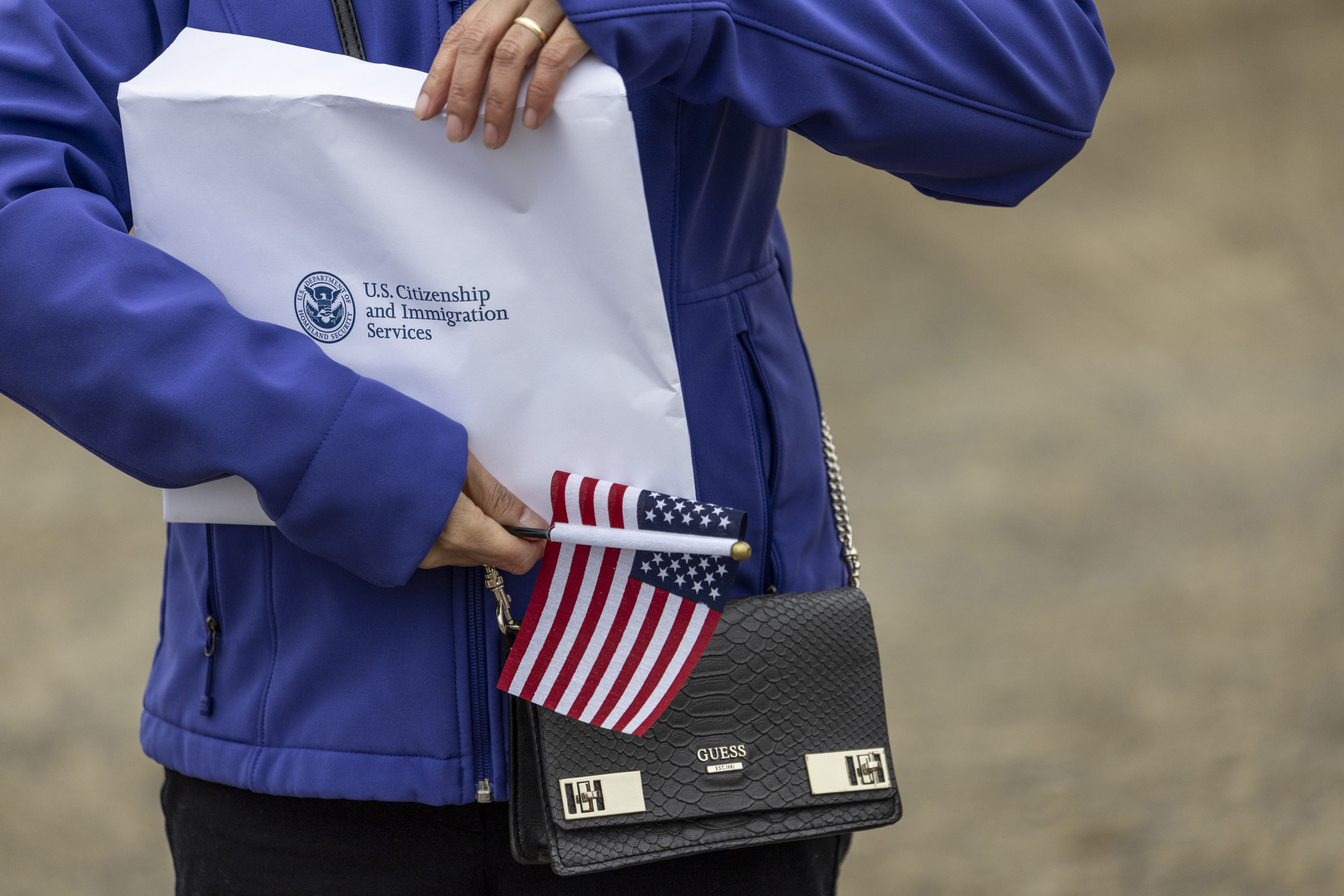Social media posts linking photo shoots by fashion label Balenciaga to "child porn" went viral this week, drawing attention from a number of right-leaning media outlets in particular.
A series of photos with children, one of which featured a toy bear wearing what appears to be bondage gear, was excoriated on Twitter by users who called the ads "disturbing" and claimed the fashion label had quickly deleted this content in response.
Others also claimed that another Balenciaga photo shoot included a legal document mentioning "virtual child porn" among its props.
However, the presentation of these claims was muddy, with comparisons involving photos from different Balenciaga shoots, accompanied by captions speculating about its response to the controversy.
Newsweek explored the facts behind the claims and accusations.

What Did Balenciaga Do?
This month, Balenciaga publicized its new joint campaign with Adidas, shot by photographer Chris Maggio. The label also released its Balenciaga Objects collection, accompanied by a campaign titled "Balenciaga Gift Shop," photographed by Gabriele Galimberti.
The Balenciaga Objects shoot included several photos of children with a series of items, including one photo with a toy bear wearing what appeared to be bondage gear. Another photo showed a toy bear wearing a string vest and a choker.
The Adidas collaboration included photos of an hourglass bag, with the bag positioned on top of a pile of papers. Among these papers was a page taken from the 2008 Supreme Court ruling United States v. Williams.
Although it is not immediately obvious that the papers in the photo are from United States v. Williams, extracts from the document can be seen in high-quality versions.
According to Oyez, a free law project by Cornell's Legal Information Institute, the said case examined whether laws banning the "pandering"—promoting—of child pornography curtailed First Amendment freedom of speech rights.
What Was Claimed on Social Media?
A tweet posted on Monday, which has had more than 70,000 engagements so far, compiled photos from the Balenciaga x Adidas and the Balenciaga Objects shoots alongside the message "the brand 'Balenciaga' just did a uh..... interesting... photoshoot for their new products recently which included a very purposely poorly hidden court document about 'virtual child porn.' normal stuff."
The account, followed by more than 500,000 Twitter users, belongs to an eponymous YouTube vlogger with 1.63 million subscribers on the video-streaming platform.
the brand "Balenciaga" just did a uh..... interesting... photoshoot for their new products recently which included a very purposely poorly hidden court document about 'virtual child porn'
— shoe (@shoe0nhead) November 21, 2022
normal stuff pic.twitter.com/zjMN5WhZ0s
The tweet, along with the photos featured in it, was widely shared on other social media platforms, including one post on Reddit that stated the Balenciaga posts were "linked to CP & trafficking."
Others directly accused the brand of promoting a "child pornography campaign" and violence against children.
The story was picked up across right-leaning media outlets including the New York Post and the Fox News show Tucker Carlson Tonight.
Carlson claimed some of the posts were "an endorsement of kiddie porn, of child pornography. What else could it be?"
"A child with a teddy bear in a bondage outfit, and a Supreme Court decision striking down a kiddie porn law displayed on the table. What is that?" he said. "Are we jumping to conclusions? Don't think so. It is what it appears to be."
Carlson also criticized other media outlets for not publicizing the story, saying: "Where is the report tonight: Balenciaga pushing kiddie porn in an Instagram ad? No, they're reserving all their energy to attack you for noticing. You're a stochastic terrorist if you point it out, and you need to be censored."
What Are the Facts?
As already established, the photos shared on Twitter were compiled from separate Balenciaga campaigns.
While the image of teddy bears wearing bondage gear and a string vest has undoubtedly caused offense and has drawn condemnation from pundits and social media users alike, it is worth stating that, contrary to what some of the comments above implied, the images are not child pornography (nor were the photos that included a printout related to United States v. Williams).
However, the photos in this and a number of other Twitter posts have been compiled together, somewhat misleadingly, to suggest they were part of the same campaign, with the implication that it evidences a conspiracy involving the fashion brand and attempts to "normalize child pornography."
Although the two campaigns are obviously connected by Balenciaga itself, the label hosts and archives its many campaigns, which are coordinated and shot by many different photographers and staff.
While both campaigns were publicized this month, the Adidas campaign is the second part of a collaboration that began in May, when the first collection dropped, according to reports by fashion publications at the time. It is described as "a collaboration between Balenciaga and Adidas [that] recontextualizes elements of sportswear that have been a part of Balenciaga's creative language."
The Balenciaga Objects is a project by the brand's creative director, Demna Gvasalia (simply known as Demna), a Georgian fashion designer, featuring limited edition adult and children's clothes, accessories, petware, home decorations and furniture, among other items. It launched this month, ahead of the upcoming festive season.
Why Is There a Supreme Court Ruling on Child Pornography in a Balenciaga Photo?
As stated, one of the photos from the Adidas collection, shot by Chris Maggio, includes a Supreme Court ruling (United States v. Williams), which examines child pornography and free speech provisions.
The details of that ruling are complex, but, crucially, its outcome strengthened federal restrictions regarding child pornography offenses.
In a blog post about the ruling, David L. Hudson Jr., an assistant professor of law at Belmont University, wrote that United States v. Williams upheld law criminalizing the advertisement or promotion of child pornography "even if underlying material doesn't qualify."
The case centered on the prosecution of sex offender Michael Williams, who told an undercover Secret Service agent he had sexually explicit pictures of his minor daughter. Williams was charged both with possession and "pandering."
While Williams pleaded guilty, he challenged the constitutionality of the pandering provision.
The matter was eventually seen by the Supreme Court, which upheld the constitutionality of the law, ruling that "offers to engage in illegal transactions are categorically excluded from First Amendment protection."
This meant that one could be prosecuted for advertising or "pandering" child pornography even if the pandered child pornography did not exist.
It was not immediately clear how and why these documents appeared in the photo shoot, given the sensitivity of the material, and whether it was a deliberate choice by the brand (and if so, what was the rationale behind it).
The original viral Twitter post about the Balenciaga photo mentions that the document was about "virtual child porn."
However, the extract of the ruling in the photo does not show the words "virtual child porn," nor does the case directly concern that.
The extract is part of an analysis with respect to United States v. Williams presented by the late Justice Antonin Scalia from May 2008, which details the grounds for material to be defined as child pornography.
It mentions that "virtual child pornography or sex between youthful-looking adult actors" is not prohibited under federal law outlining "activities relating to material constituting or containing child pornography" as defined under U.S. Code § 2252A.
Free speech provisions regarding "virtual child pornography" were ruled on by the Supreme Court in a different case: Ashcroft v. Free Speech Coalition.
Professor Melissa Hamilton, a professor of law and criminal justice at the University of Surrey School of Law, U.K., who has extensive knowledge of the prosecution of child pornography cases, told Newsweek that the United States v. Williams case was about establishing free speech limits and defenses.
"[The] defendant actually did have child pornography and was found guilty of possession. But he did not have images of his own child, which he had advertised," Hamilton said.
"The ruling was about whether one could be guilty of pandering if they offered what they said was actual child pornography even if they did not in fact have it.
"The answer was yes, basically because it is an offer to engage in a transaction that would be illegal if what the defendant was conveying about its nature was true.
"[The] Supreme Court ruled that virtual child pornography—typically created by technology and does not include actual children—was protected by the First Amendment and thus could not be criminalized. It is also noted that this is not true in other countries that do criminalize virtual child pornography."
Professor Carissa Byrne Hessick, a distinguished professor of law at the University of North Carolina at Chapel Hill, with expertise in the prosecution of child pornography crimes, told Newsweek that if the Balenciaga photos were "some sort of hidden message that somehow endorses child pornography or virtual child pornography, Williams seems like a bad case to convey that message" because "Williams lost his case."
Without further information or context provided by the brand at the outset, it wasn't surprising that questions were being raised as to why this document, with this particular extract, was included in a photoshoot, even as it was not in and of itself evidence of any child abuse conspiracy involving Balenciaga.
Some claims on Twitter suggested that Balenciaga and Galimberti scrubbed their social media in response to the uproar.
While Balenciaga has wiped its Instagram feed in the past to launch new collections, it did not appear to be the case this time.
Balenciaga did update its Instagram page on Monday with new photos.
Newsweek found a screengrab that suggests the company posted the photos from the Balenciaga Objects campaign on its Instagram before Monday, including some that were shared on Twitter, which were no longer visible on its page.
On Tuesday evening, the fashion label finally addressed the controversy, via its Instagram stories, and confirmed that at least some of the photos were removed from its accounts.
"We sincerely apologise for any offense our holiday campaign may have caused. Our plush bear bags should not have been featured with children in this campaign. We have immediately removed the campaign from all platforms," the Balenciaga statement said.
"We apologise for displaying unsettling documents in our campaign. We take this matter very seriously and are taking legal action against the parties responsible for creating the set and including unapproved items for our Spring 23 campaign photo shoot. We strongly condemn abuse of children in any form. We stand for children safety and well-being."
Galimberti, who also appears to have removed one of the photos from his Instagram page, told Newsweek in an email that he is not in a position to comment on Balenciaga's choices.
"But I must stress that I was not entitled in whatsoever manner to neither chose the products, nor the models, nor the combination of the same.
"As a photographer, I was only and solely requested to lit the given scene, and take the shots according to my signature style.
"As usual, the direction of the campaign and of the shooting are not on the hands of the photographer.
"I suspect that any person prone to pedophilia searches on the web and has unfortunately a too easy access to images completely different than mine, absolutely explicit in their awful content.
"Lynching like these are addressed against wrong targets, and distract from the real problem, and criminals," Galimberti wrote.
A spokesperson for Balenciaga told Newsweek on Thursday, via email: "We recognize the seriousness of this matter and condemn all forms of child abuse.
"We immediately removed the Holiday campaign from our platforms and will cease to sell the plush bears it featured.
"In addition, we are actively investigating the content of the Spring 23 campaign and are pursuing legal action against the outside contractors who oversaw the creation and management of the sets.
"We are also reviewing and strengthening internal protocols to ensure that this doesn't happen again.
"We sincerely apologize for any offense our Holiday and Spring 23 campaigns may have caused."
Newsweek has contacted Adidas and Chris Maggio's representatives for comment.
Update 11/24/22, 04:07 a.m. ET: The story has been updated to include comments from Balenciaga.
Update 11/23/22, 10:12 a.m. ET: This story has been updated to include additional comments.
About the writer
Tom Norton is Newsweek's Fact Check reporter, based in London. His focus is reporting on misinformation and misleading information in ... Read more



